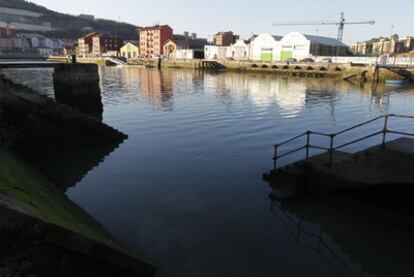Forgotten Bilbao: across the river
Stray beyond the Guggenheim, where the old part of the city is a world all of its own
Split in two by the river Nervión, Bilbao is a city of dichotomies. To one side rises Frank Gehry's Guggenheim, a gracefully hulking titanium-clad dinosaur. A Calatrava-designed footbridge arches sublimely, suggesting a futuristic rib cage, while the city's tram system glides over strips of trimmed lawn.
To the other side is the Casco Viejo - the old town - which has been something of the underappreciated cousin in tourist guides ever since the Guggenheim era began. The contrast, though, is magnificent. The sense of Bilbao's industrial past - and further back, even, to its medieval port days - is immediately present once over the river. The area has a sense of history, only interrupted by glimpses of the modern design in the background.
Late-winter mornings in Bilbao are a crisp reminder of the city's proximity to the Atlantic. The stillness of a morning visit to the 64-arch Plaza Nuevo or the gothic 12th-century Catedral de Santiago can be truly transportive. It can be informative too, after a stroll through Museo Vasco, where displays on the lives of Basque shepherds and topographical dioramas are housed in an austere 16th-century convent.
On the inner edge of the Casco Viejo is the Mercado de la Ribera. A fixture in Bilbao since the 14th century, its three floors are always bustling with elderly women and buyers from local restaurants, pointing and scrutinizing with a seriousness fitting of the Basque reverence for food. The bottom floor, devoted entirely to seafood, is educational given its comprehensive range of what can be plucked out of the nearby ocean. Even the least culinary-minded of visitors will be inspired to put on an apron. Or, at least, let a Bilbaíno chef do the honors.
A few paces toward the center of the Casco Viejo leads the visitor to a web of narrow, cobbled streets, where people gather around barrels outside bars, pouring the regional white wine txakoli from great heights and eating pintxos - the Basque word for the bar-top tapas, often pricked with toothpicks. These artfully complex bite-size structures are welcome eye-candy on any bar tour.
But there is simpler fare to be had too. Along Somera street is Bar Montrikes, a no-frills venue where the grilled mushrooms have gained something of a cult following - and with good reason.
Nearby is Kafe Antzokia, an unusual music bar where hearing reggae, Madonna and Basque folk songs in the same evening is not a rare event. The venue boasts a full calendar of live music, and is a good after-dinner choice.
For a more antique musical experience, the Teatro Arriaga - named after the child prodigy-composer born in Bilbao - lies a short walk away. Though it has been eclipsed in popularity in recent years by the grandiose Palacio de Euskalduna, it should not be overlooked. A walk around the rear of the 19th-century building reveals stained-glass windows and expressive caryatids holding up the arches facing the river.
A stroll along the river can double as a street-art scavenger hunt - if you know where to look. Art by Invader - a French street artist famous for installing tile mosaics of extra terrestrials inspired by the Space Invaders video game - has popped up in several dozen nooks and crannies in Bilbao. The playful images set against the antique city will make you look twice; he chooses his spots well.
Nights often end in the Casco Viejo with a last glass of cider and scenes of Bilbaínos arranged in circles down virtually every street, singing Basque folk songs that everyone seems to know. The warmth of this practice is something to behold, a reminder that it is another world up here in the north, with a mysterious language and an allure all its own.

Tu suscripción se está usando en otro dispositivo
¿Quieres añadir otro usuario a tu suscripción?
Si continúas leyendo en este dispositivo, no se podrá leer en el otro.
FlechaTu suscripción se está usando en otro dispositivo y solo puedes acceder a EL PAÍS desde un dispositivo a la vez.
Si quieres compartir tu cuenta, cambia tu suscripción a la modalidad Premium, así podrás añadir otro usuario. Cada uno accederá con su propia cuenta de email, lo que os permitirá personalizar vuestra experiencia en EL PAÍS.
¿Tienes una suscripción de empresa? Accede aquí para contratar más cuentas.
En el caso de no saber quién está usando tu cuenta, te recomendamos cambiar tu contraseña aquí.
Si decides continuar compartiendo tu cuenta, este mensaje se mostrará en tu dispositivo y en el de la otra persona que está usando tu cuenta de forma indefinida, afectando a tu experiencia de lectura. Puedes consultar aquí los términos y condiciones de la suscripción digital.








































